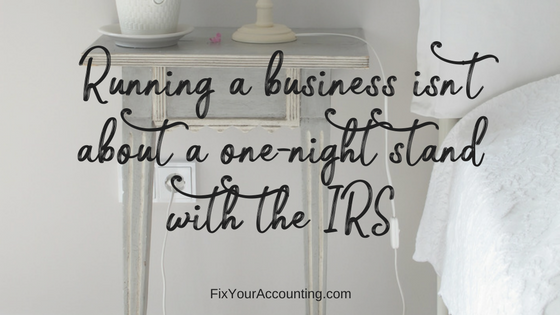1. Waiting too long to set-up accounting software
Many businesses wait until the second or third year of operations to set up a bookkeeping system. One reason is the realization your business has a good chance of making it. Another reason is that it’s time to apply for a business loan and the bank asked for financial statements. Sometimes books are set-up because it’s stressful not knowing the financial health of your business. Or maybe multiple years of tax returns must be filed.
How can you get off to a good start with your bookkeeping? Hire a bookkeeper to set-up your books as soon as you start your business and learn how to do your bookkeeping. Have at least a quarterly meeting to review your work and learn to understand your financial statements. Your financial statements tell the story of your business and you want the story to be a best seller, right?
2. The annual one-night stand with the IRS
While this is common with new businesses, the surprising part is the number of larger, more established businesses that scramble at the last minute year after year to slam dunk their bookkeeping to file tax returns.
I’ve done a lot of bookkeeping clean-up and catch-up work and I can tell you stories that will give you nightmares. It’s hard, tedious work, sometimes bordering on the forensic. Some bookkeepers compare this work to assembling a jigsaw puzzle. Many pieces of information have to be assembled to get accurate financial statements. If you will allow me a moment of bragging, I’ll say that I’m darn good at it.
You will likely pay 20-30% more for the annual slam dunk bookkeeping than if the work was done each month. Why? Becuase it takes longer. I may also have to fix mistakes made by you or another bookkeeper. Do you remember the details of every transaction from ten months ago? Do you know where the receipts and bank statements are? Did you remember that you accidentally paid business expenses on your personal credit card?
I have to wait for you to download and email bank transaction files, dig up receipts, download months of bank and credit card statements, and answer questions. Invariably, some information is not to be had. Accounts were closed, business relationships ended, employees fired, hard drives crashed, or you simply forgot the information. It can also be challenging to quickly get up to speed on how you run your business, especially if the way you do business with your customers changes often.
Then there is the OMG tax bill from the IRS. What? How can you owe taxes AGAIN this year? And you’re already making payments on the tax bill from last year. Not proactively managing your business finances can be the path to bankruptcy.
It’s true that numbers don’t lie. (Yes, numbers can be manipulated; that’s not what I’m talking about.) Once all the transactions have been entered and reconciled to the bank and credit card statements, those numbers tell a story. Unfortunately, that story is all too often one of neglect. It’s not the bookkeeper’s fault.
Your business finances are not about tax returns, investors, or auditors. You started your business because you are passionate about the product or service you offer, right?
The alternative to the annual one-night stand with the IRS is to work with a bookkeeper (me) to set-up a bookkeeping system and learn how to do your bookkeeping (or outsource it) AND do the bookkeeping monthly. Learn to understand the story of your numbers and how to make that story a best seller.
3. Assuming bookkeeping has nothing to do with everyday business operations.
As I said above, your numbers tell the story of your business. Those numbers reflect every business decision, every dollar spent, and every sale you make. If you set up a complicated business structure, your bookkeeping will be just as complicated. As your business grows, your bookkeeping won’t get any easier.
Choosing to sell on Etsy, Amazon, E-bay, your own e-commerce site, tradeshows, and farmer’s markets accepting payment via PayPal, Square, Stripe, and cash can be a bookkeeping nightmare when it comes to recording those transactions. Creating custom pricing and payment plans for many customers is even worse.
You have access to amazing, cost-effective technology to run your businesses. Integrations can be the next best thing since Netflix. Accounting software set-up correctly and enhanced with the right add-ons (integrations) can help you provide better and faster service to your customers for less time and money. And make your bookkeeping easier.
When you schedule an appointment with me, the first question I’ll ask you is what you sell and how you sell it. Your answers will tell me a lot about your business. As a systems geek, I start thinking of ways to streamline your business operations. It’s what I do and I do very well. What you sell and, more importantly, how you sell it has everything to do with whether or not you just created a bookkeeping nightmare.
All three of these mistakes can be avoided or corrected if you’ve fallen into the trap of the annual one-night stand with the IRS. Messy bookkeeping prevents you from making timely business decisions. Instead of planning for the future of your business, you get stuck in a cycle of reacting at the last minute.
